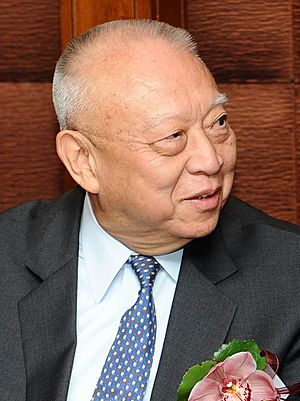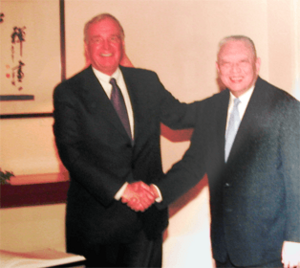Tung Chee-hwa facts for kids
Quick facts for kids
Tung Chee-hwa
GBM
|
|||||||||||||||||||||||||
|---|---|---|---|---|---|---|---|---|---|---|---|---|---|---|---|---|---|---|---|---|---|---|---|---|---|
|
董建華
|
|||||||||||||||||||||||||

Tung in 2011
|
|||||||||||||||||||||||||
| 1st Chief Executive of Hong Kong | |||||||||||||||||||||||||
| In office 1 July 1997 – 12 March 2005 |
|||||||||||||||||||||||||
| President | Jiang Zemin Hu Jintao |
||||||||||||||||||||||||
| Premier | Li Peng Zhu Rongji Wen Jiabao |
||||||||||||||||||||||||
| Preceded by | Office established Chris Patten (as Governor of Hong Kong) |
||||||||||||||||||||||||
| Succeeded by | Donald Tsang | ||||||||||||||||||||||||
| Vice Chairman of the Chinese People's Political Consultative Conference | |||||||||||||||||||||||||
| In office 12 March 2005 – 10 March 2023 |
|||||||||||||||||||||||||
| Chairman | Jia Qinglin Yu Zhengsheng Wang Yang |
||||||||||||||||||||||||
| Member of the Executive Council of Hong Kong | |||||||||||||||||||||||||
| In office 7 October 1992 – 3 June 1996 |
|||||||||||||||||||||||||
| Appointed by | Chris Patten | ||||||||||||||||||||||||
| Personal details | |||||||||||||||||||||||||
| Born | 7 July 1937 Xuhui, Shanghai, China |
||||||||||||||||||||||||
| Spouse |
Betty Tung
(m. 1961) |
||||||||||||||||||||||||
| Children | Alan Tung Lieh-sing (son) Andrew Tung Lieh-cheung (son) Audrey Slighton Tung Lieh-yuan (daughter) |
||||||||||||||||||||||||
| Relatives | Audrey Alice King & Yvette Yao (grandniece) | ||||||||||||||||||||||||
| Residences | Grenville House, Mid-Levels | ||||||||||||||||||||||||
| Education | Chung Wah Middle School | ||||||||||||||||||||||||
| Alma mater | University of Liverpool (BS) | ||||||||||||||||||||||||
| Occupation |
|
||||||||||||||||||||||||
| Signature | |||||||||||||||||||||||||
| Chinese name | |||||||||||||||||||||||||
| Traditional Chinese | 董建華 | ||||||||||||||||||||||||
| Simplified Chinese | 董建华 | ||||||||||||||||||||||||
|
|||||||||||||||||||||||||
Tung Chee-hwa (born July 7, 1937) is a Hong Kong businessman and former politician. He was the very first Chief Executive of Hong Kong. This important role started in 1997 when Hong Kong became part of China again. He served until 2005.
After leaving his role as Chief Executive, he became a vice chairman of the Chinese People's Political Consultative Conference (CPPCC). This is a top advisory body in China. He held this position from 2005 to 2023.
Tung Chee-hwa was born into a family that owned a large shipping company called Orient Overseas Container Line (OOCL). He took over the family business after his father passed away in 1981. A few years later, the company faced serious money problems. The government of China helped save the business in 1986.
He became involved in politics in Hong Kong in 1992. He was chosen to be the first Chief Executive of Hong Kong in 1996. During his time in office, Hong Kong faced several big challenges. These included the 1997 Asian Financial Crisis and health issues like bird flu and SARS. He resigned in 2005 before his second term ended.
After his resignation, he continued to be an important figure. He started groups like the China–United States Exchange Foundation to help improve understanding between China and the United States. He also founded a think tank called Our Hong Kong Foundation. Many important business leaders are part of this group.
Contents
Early Life and Family Background
Tung Chee-hwa was born in Shanghai, China, on July 7, 1937. His family was well-known for their shipping business. His father, Tung Chao Yung, started the Orient Overseas Container Line. This company had strong connections with the government of China at the time.
In 1949, when Tung was 12, his family moved to Hong Kong. His father kept close ties with the government in Taiwan. Tung went to Chung Wah Middle School in Hong Kong. Later, he studied at Liverpool University in England, where he earned a degree in marine engineering in 1960. He then worked as an engineer in the United States before returning to Hong Kong in 1969.
Starting a Career in Business and Politics
Tung joined his father's shipping company in 1969. He took over as the head of the business in 1982 after his father died. By 1985, the company was in serious financial trouble. A businessman named Henry Fok, who had connections with the Chinese government, helped save Tung's family business.
After this, Tung became very close to the Chinese government in Beijing. He developed a strong relationship with Jiang Zemin, who was a powerful leader in China. Tung was also part of the committee that helped write the Basic Law of Hong Kong. This law is like Hong Kong's mini-constitution.
In 1993, he joined the Chinese People's Political Consultative Conference. This is a high-level advisory group in China. He also built connections with important people in the United States, like President George H. W. Bush.
In 1992, the last British Governor of Hong Kong, Chris Patten, appointed Tung to the Executive Council of Hong Kong. This was a top advisory group in the government. This appointment showed that Tung was becoming more involved in politics.
Before the election for the first Chief Executive, it was clear that Beijing supported Tung. He was elected by a special 400-member committee on December 11, 1996. He received 320 votes. Tung Chee-hwa officially became the first Chief Executive of the Hong Kong Special Administrative Region on July 1, 1997. This was the day Hong Kong was returned to China.
As Chief Executive of Hong Kong
First Term in Office
Tung Chee-hwa became the Chief Executive on July 1, 1997. His government promised to focus on three main areas: housing, support for the elderly, and education. For housing, they aimed to build 85,000 new homes each year. However, the Asian financial crisis hit Hong Kong soon after he took office. This caused property prices to fall sharply.
The financial crisis made things very difficult for Hong Kong. Many people lost their jobs, and the value of stocks and properties dropped. Some people criticized Tung's economic policies. This led to public questions about his leadership and the government.
During his first term, the government also proposed several large projects. These included a technology park, a science park, and the Hong Kong Disneyland theme park. Some of his decisions, like giving the Cyberport project to a specific company without open bidding, caused debate.
His administration faced many challenges. There were problems with the opening of the Hong Kong International Airport. The government was also criticized for how it handled the avian influenza outbreak. Public satisfaction with Tung's leadership dropped significantly.
Second Term in Office
Tung Chee-hwa ran for a second term in 2002 and was the only candidate. He was re-elected without competition. To try and improve how the government worked, Tung changed its structure. He introduced a system where top officials were chosen by him directly. This was meant to help the government work more smoothly.
Challenges in 2003
One of Tung's first big moves in his second term was to propose a new law called the National Security (Legislative Provisions) Bill 2003. This law was meant to put Article 23 of the Basic Law into action. However, many people were worried that this law would limit their freedoms.
This concern, along with the SARS outbreak in early 2003, led to a huge protest. On July 1, 2003, over 500,000 people marched in Hong Kong. Many demanded that Tung step down. Because of the strong public opposition, the government had to postpone and later withdraw the proposed law. Several top officials also resigned around this time.

The economy started to improve in 2004. Unemployment went down, and prices stopped falling. This helped reduce public unhappiness. However, Tung's own popularity remained low compared to other government leaders.
Resignation
In December 2004, China's President Hu Jintao publicly criticized Tung's government. This added to the pressure on Tung. Speculation grew that he would resign. On March 10, 2005, Tung announced that he was stepping down due to "health problems."
The next day, he flew to Beijing. On March 12, 2005, he was elected Vice Chairman of the Chinese People's Political Consultative Conference (CPPCC). His resignation led to discussions about who would take over and for how long.
After Being Chief Executive
In U.S.−China Relations
After resigning as Chief Executive, Tung became a vice-chairman of the Chinese People's Political Consultative Conference (CPPCC) in March 2005. In 2008, he started the China-United States Exchange Foundation (CUSEF). This group aims to help the United States and China understand each other better.
Influence in Hong Kong
Tung Chee-hwa continued to be an important figure in Hong Kong politics. In 2014, he founded a think tank called Our Hong Kong Foundation. This group has many well-known business leaders and public figures as advisors. The foundation suggests ideas for public policies, especially about housing.
In the 2017 Chief Executive election, Tung was seen as a "kingmaker." This means he had a lot of influence over who would become the next leader. He was seen supporting Carrie Lam, who later became the Chief Executive. In July 2017, Tung's family business, Orient Overseas (International) Limited, was sold to a Chinese state-owned company.
Awards and Recognition
Tung Chee-hwa received the Grand Bauhinia Medal in 2006. This is a very high honor in Hong Kong. He also received an honorary doctorate degree from the Hong Kong University of Science and Technology.
In September 2019, he was given a national honorary title by China's President Xi Jinping. This award recognized him as an "Outstanding Contributor of One Country, Two Systems." This title highlights his role in the special arrangement that allows Hong Kong to have its own system while being part of China.
See also
 In Spanish: Tung Chee-hwa para niños
In Spanish: Tung Chee-hwa para niños
- Politics of Hong Kong
- Executive Council of Hong Kong
 | Stephanie Wilson |
 | Charles Bolden |
 | Ronald McNair |
 | Frederick D. Gregory |

